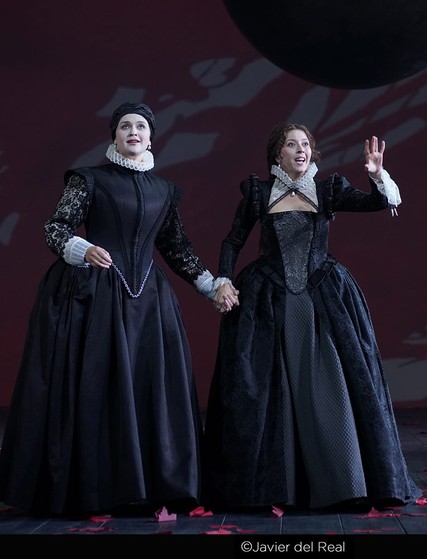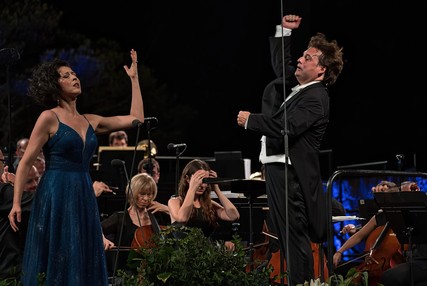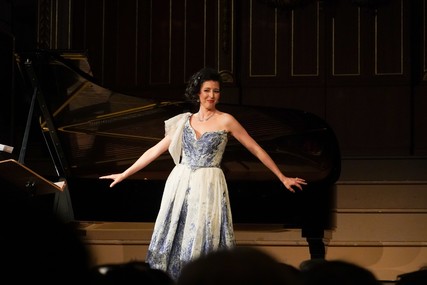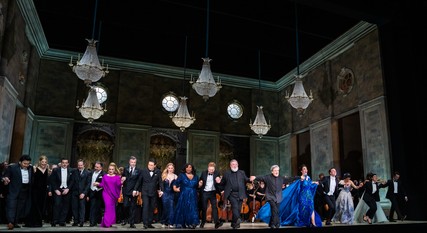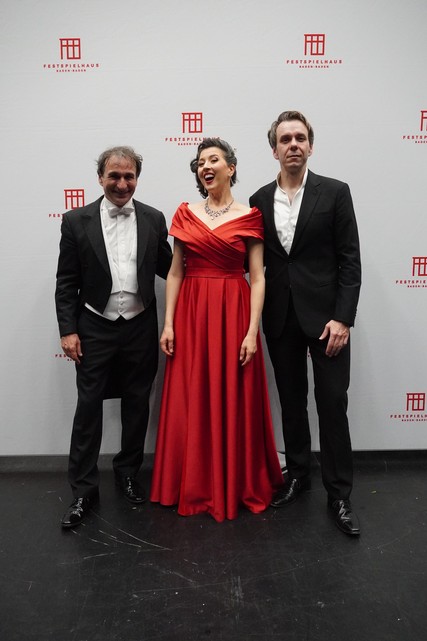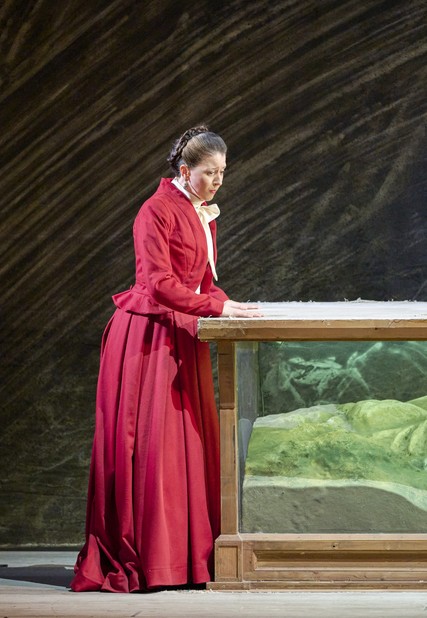2024
Teatro Real - Maria Stuarda
Nov, 2024 - Dec, 2024Maria Stuarda, ¡gracias Lisette!
Oropesa acierta en su página de entrada “Oh nube! che lieve per l'aria t'aggiri” y sabe dar sentimiento en “Di un cor che more”, ya dentro de lo que Donizetti bautizó como “el aria del suplicio” al final de la ópera, para terminar a lo grande en la cabaleta “Ah!, se un giorno de queste ritorte”. Seguridad en el registro agudo -una nota calante no desmerece-, la claridad en la emisión y el impulso sentimental, cantando sí, pero también interpretando. Vuelvo al inicio, en esa escena final sentí una emoción que no vivía desde hace mucho tiempo, llegando a aflorar las lágrimas. Por un momento, cerrando los ojos, se volvían a escuchar intenciones y armas de Caballé y, volviéndolos a abrir, incluso llegué a verla en la escena. Créanme que eso es un gran mérito de Oropesa, por cierto residente ahora en Madrid con piso en la Latina.Oropesa hits the mark with her entrance aria "Oh nube! che lieve per l'aria t'aggiri" and knows how to imbue "Di un cor che more" with emotion, within what Donizetti dubbed "the aria of torment" at the opera's end, culminating grandly in the cabaletta "Ah!, if one day these pains". Confidence in the high register - a sliding note does not detract - clarity in emission, and emotional drive, singing, yes, but also acting. Returning to the beginning, in that final scene, I felt an emotion I hadn't experienced in a long time, bringing tears to my eyes. For a moment, with closed eyes, one could again hear the nuances and power of Caballé, and upon opening them, I could even see her on stage. Believe me, that is a great credit to Oropesa, who, by the way, now resides in Madrid with an apartment in La Latina.— Gonzalo Aonso • La RazónABAO Opera Bilbao - Recital
Nov, 2024Lisette Oropesa, virtuosismo vocal
Nos gustó mucho el melismático bolero de Delibes en el que exhibió todo tipo de escalas, picados y sostenidos gorgoritos y una inmaculada afinación. En la segunda mitad, como belcantista de depurada técnica, la jovial soprano atrajo la atención con el aria de la ópera L´Elisir D´Amore de Donizetti y sobre todo, en la difícil canzonetta «La Primavera» de Mercadante. Sin duda, Lisette Oropesa se movió a sus anchas en las piezas más ligeras, en las que su voz se adentraba con absoluta seguridad en los filados etéreos y en el dominio del registro agudo.We greatly enjoyed the melismatic bolero by Delibes in which he displayed all sorts of scales, staccato and sustained trills, and immaculate tuning. In the second half, the jovial soprano, with her refined bel canto technique, captivated attention with the aria from Donizetti's opera L'Elisir d'Amore and most notably, within the challenging canzonetta "La Primavera" by Mercadante. Undoubtedly, Lisette Oropesa comfortably excelled in the lighter pieces, in which her voice confidently ventured into ethereal sustains and the mastery of the high register.— Nino Dentici • El CorreoGrand Théâtre de Genève - Recital
Nov, 2024Lisette Oropesa, de Genève à Cadix et Cuba
Un menu conséquent en somme, que la soprano vedette dévore avec un appétit qui semble plus que jamais venir en chantant. L’interprète confère à chaque mot tout son sens, à chaque émotion tout son poids, qu’il s’agisse d’évoquer l’amour, la peine, le rêve ou le regret. De cette Andalousie dont il est d’abord question, l’artiste restitue la chaleur et l’âme, dansante et enivrante, d’une voix aussi large que les jardins de l’Alcazar, avec un timbre aussi chaud et fleuri qu’une rue du vieux Cadix. Il y a aussi ce soleil, éclatant, qui émane d’aigus hardis mais tout en maîtrise, ici triomphaux, là presque susurrés, mais toujours d’une implacable tenue sonore. Le public s’en délecte, applaudissant après chaque mélodie cette artiste n’hésitant pas, à l’occasion, à esquisser quelques pas de danse chaloupés.A substantial menu, indeed, that the star soprano devours with an appetite that seems to grow even stronger as she sings. The performer brings to each word its full meaning, to each emotion its full weight, whether evoking love, sorrow, dreams, or regret. From Andalusia, the subject at hand, the artist captures the warmth and soul, danceable and intoxicating, with a voice as expansive as the gardens of the Alcazar, with a timbre as warm and blooming as a street in Old Cadiz. Then there’s the sun, brilliant, radiating from bold but perfectly controlled high notes, here triumphant, there almost whispered, but always with an implacable sonic presence. The audience revels in it, applauding after each melody this artist who, on occasion, does not hesitate to break into a few swaying dance steps.— Pierre Géraudie • OlyrixCarnegie Hall - Recital
Oct, 2024Castanet diva
One of the striking features of the program was how quickly and seamlessly Oropesa could turn on a dime from extroverted vocal display to quiet introspection or sensuous languor in the more serious song selections. The timbre would morph from diamantine brilliance to a darker silver tone with a cool luster depending on the music.None— Eli Jacobson • ParterreThéâtre des Champs-Elysées - Mozart Requiem
Oct, 2024Requiem de Mozart recueilli au Théâtre des Champs-Elysées
Enfin, Lisette Oropesa déclame avec un solide legato, une prononciation impeccable et une égalité dans les registres, de longues phrases incarnées et défendues avec une émotion palpable, notamment son entrée et sa partie conclusive où la salle frémit avec elle de l’intensité du moment et de la gravité d’un texte musical aussi impérissable.Lastly, Lisette Oropesa declares with a solid legato, impeccable pronunciation, and evenness in her registers, long embodied phrases defended with palpable emotion, notably her entrance and her concluding part where the room quivers with her during the intensity of the moment and the gravity of such an imperishable musical text.— Philippe Scagni • OlyrixLes Arts - Manon
Sep, 2024 - Oct, 2024El Palau de les Arts de Valencia aclama la Manon de Lisette Oropesa
Porque no es menor el hecho de que 'Manon' de Massenet derive buena parte de su fama al conglomerado de bellas melodías que aquí es escuchan muy bien perfiladas por Lisette Oropesa, protagonista absoluta de la reposición. Puestos a elegir un matiz de su actuación merecería la pena destacar la facilidad con la que describe el personaje desde la ingenua alegría de su 'Je suis encore tout étourdie', pasando por el reflexivo lamento en 'Adieu, notre petite table', tan dulcemente expresado; la nobleza de sus arrogantes agudos en 'Je marche sur tous les chemins', y la candidez de su despedida final. Oropesa canta en Valencia su primera Manon europea tras la apoteosis de su presentación en el Metropolitan de Nueva York. Las importantes exigencias vocales del papel tienen respuesta en la facilidad de emisión, la calidad de las medias voces, la delicadeza de los efectos y el dominio del registro agudo. En un concepto eminentemente dulce.The fact that Massenet's "Manon" draws a significant portion of its fame from a collection of beautiful melodies is definitely not minor, melodies that here are very well outlined by Lisette Oropesa, the absolute protagonist of the revival. When choosing a nuance of her performance, it would be worth highlighting the ease with which she describes the character from the naive joy of her 'Je suis encore tout étourdie', through the reflective lament in 'Adieu, notre petite table', so sweetly expressed; the nobility of her haughty highs in 'Je marche sur tous les chemins', and the innocence of her final farewell. Oropesa sings her first European Manon in Valencia after the apotheosis of her introduction at the Metropolitan Opera in New York. The significant vocal demands of the role are met with ease of emission, the quality of the half-voice, the delicacy of the effects, and the command of the high register. In a concept that is eminently sweet.— Alberto González Lapuente • ABC.esWiener Staatsoper - La traviata
Sep, 2024WIEN / Staatsoper: LA TRAVIATA mit Oropesa, Floréz & Dupuis
Allen voran die mitreißend singende wie auch darstellerisch berührende Lisette Oropesa in der Titelrolle. Die kubanisch-amerikanische Sopranistin bringt alles mit, was für diese Rolle essenziell ist: Eine wunderschöne Stimme, gerade groß genug, hell und fein timbriert, ausdrucksstark und technisch so versiert, dass sie mit eleganter Leichtigkeit anmutig und geradezu schwerelos durch die Kadenzen schweben kann. Sie ist zu zartestem Pianissimo fähig, aber auch in kraftvolle Sequenzen wie in „Sempre lbera“ sattelfest. Bewundernswert, wie sich Oropesa in den sich ändernden Gefühlswelten verwandeln kann, von verliebter Glückseligkeit im ersten Akt bis zur erschütternden Verzweiflung in „Addio del passato“ und dem letzten Aufflackern des Lebens- und Liebenswillen angesichts des Todes. Darstellerisch überzeugt sie mit ehrlicher, liebenswerter Aufrichtigkeit, nicht mit großen Gesten.Foremost among them is the captivatingly singing and emotionally engaging Lisette Oropesa in the title role. The Cuban-American soprano possesses everything essential for this role: a beautiful voice, just large enough, bright and finely timbred, expressive and technically skilled enough to gracefully and almost weightlessly float through the cadenzas with elegant ease. She is capable of the most delicate pianissimo, but also solid in powerful sequences like in "Sempre libera." Admirable is how Oropesa can transform herself in the changing emotional worlds, from the blissful joy of being in love in the first act to the heartbreaking despair in "Addio del passato" and the final flicker of life and will to love in the face of death. In her portrayal, she convinces with honest, lovable sincerity, not with grand gestures.— Manfred A. Schmid • Online MerkerSalzburger Festspiele - Hamlet
Aug, 2024Shakespeare als große Oper: Umjubelter „Hamlet“ in Salzburg
So wie auch, und ganz besonders, Lisette Oropesa. Wenn sie die Ophélie gibt, dann bleibt die Figur nicht bloß eine gläsern-zerbrechliche Femme fragile: Stattdessen erfüllt die Koloratursopranistin ihre einmal schlichten, dann wieder reich verzierten Kantilenen mit der Fülle und der Wärme einer Liebenden, die auf für sie unbegreifliche Weise enttäuscht wird und daraufhin in den Tod geht. Ein Hauch Cotrubas klingt da im Timbre an, eine Prise Gheorghiu – und doch ist Oropesa eine Diva eigenen Ranges, die ihre leuchtenden Spitzentöne in zartes Piano zurücknehmen kann: Das provozierte Jubelstürme schon nach ihrer Wahnsinnszene.Just as, and especially, Lisette Oropesa. When she assumes the role of Ophélie, the character is not merely a fragile, glass-like femme fragile: Instead, the coloratura soprano infuses her sometimes simple, sometimes richly ornamented cantilenas with the fullness and warmth of a lover who is incomprehensibly betrayed and subsequently succumbs to death. In her timbre, there's a hint of Cotrubas, a dash of Gheorghiu - and yet Oropesa is a diva of her own class, capable of modulating her luminous high notes into delicate piano: This provoked storms of applause already after her mad scene.— Walter Weidringer • Die PresseFestival Cap Rocat - Concert
Aug, 2024Salvas de virtuosismo en el Festival Cap Rocat: Lisette Oropesa reina en la fortaleza mallorquina
Entre todas estas piezas, todas interpretadas a un nivel sinigual que dejó fascinado a un publico totalmente entregado, destacó Oh, nube! Che lieve per l'aria, de la obra de Donizetti Maria Estuarda, que la soprano interpretará por primera vez en su carrera en el Teatro Real la próxima temporada. Valga subrayar los bises con los que Oropesa concluyó una velada redonda. Después de volver sobre sus pasos, la soprano tomó la palabra para compartir una información de la que había sido conocedora días antes. Su bisabuela, nacida en la isla de Mallorca, era el último eslabón en unirse a un largo linaje de mujeres ligadas a tierras hispanoparlantes en la familia de la artista. Con motivo de ese lazo, que continúan la cantante, de origen cubano, y su madre, española de nacimiento, interpreto como colofón final la Romanza de María la O, de la zarzuela del compositor cubano Ernesto Lacuona, Maria la O y, por último, Las carceleras de la zarzuela cómica española Las hijas de Zebedeo.Among all these pieces, all performed at an unrivaled level that fascinated an utterly devoted audience, one stood out: "Oh, nube! Che lieve per l'aria," from Donizetti's Maria Stuarda, which the soprano will perform for the first time in her career at the Teatro Real next season. It is worth highlighting the encores with which Oropesa concluded a perfect evening. After retracing her steps, the soprano took the floor to share information she had learned days earlier. Her great-grandmother, born on the island of Mallorca, was the latest link in a long lineage of women connected to Spanish-speaking lands in the artist's family. To commemorate this bond, both the singer, of Cuban origin, and her mother, born in Spain, performed as a final flourish the Romanza from Ernesto Lecuona's Cuban zarzuela "Maria la O," and lastly, "Las carceleras" from the Spanish comic zarzuela "Las hijas de Zebedeo."— Ángel Mora • El EspañolMetropolitan Opera - Taiwan Concert
Jun, 2024Metropolitan Opera - Concert
Jun, 2024Metropolitan Opera - Korea Concert
Jun, 2024A singing orchestra that presents a feast of sound
The second songs were two Mozart concert arias by American soprano Lisette Oropesa. It was a superb performance combining Oropesa's flawless technique, rich tone, and wonderful accompaniment worthy of an opera orchestra. I thought it would have been great if yesterday's program consisted of only Mozart opera overtures and arias.None— Gwangyeol Jeon • MBN (MSN.com)Carnegie Hall - Concert
Jun, 2024Night of the Queen of the Night
In her early Mozart aria A Berenice, Ms. Oropesa changed colors, played with the words, ripped up and down the scale like a marathon sprinter, and offered a rainbow-colored gift to us all.(By the way the story that A Berenice was the 13‑year‑old Mozart’s thank‑you letter to Aunt Berenice for a bar mitzvah gift is almost certainly fallacious.)This was Queen of the Night stuff incarnate. Coloratura, yes, with scales darting past a high D. Yet also tender, with a sensuous legato. Trills worthy of any Classical diva, precise leaps over the octaves. But above all, a care for the words, a change of sounds, a miraculous merger of vocalism and verbal understanding.None— Harry Rolnick • Concerto NetMusikverein Graz - Recital
Teatro alla Scala - Recital
May, 2024Royal Opera House - Celebrating 22 Years Of Antonio Pappano
May, 2024Antonio Pappano Celebration — the Royal Opera maestro’s regal sendoff
The soprano Lisette Oropesa showed brilliant vocal acting in her Don Pasquale nugget and later soared assuredly over the trio from Der Rosenkavalier. the ecstatic conclusion to Rossini’s William Tell, with Finley as the Swiss freedom fighter, Oropesa’s soprano glinting again and the chorus movingly imploring: “Reign over us once more!”None— Neil Fisher • The TimesHungarian State Opera - Recital
Festspielhaus Baden Baden - Concert
Gran Theatre del Liceu - Gala Concert
May, 2024Pour ses 177 ans, le Liceu fait briller quatre étoiles
En deuxième partie, Oropesa nous offrira une valse de Juliette miroitante à souhait : sa voix possède ce brillant orné de velours qui laisse jaillir une artiste élégante et noble. Ensuite Camarena attaquera « Ah, lève-toi, soleil » du même ouvrage. Magistral aussi, car l’éclat de son instrument est mis au service d’un interprète engagé, intelligent et sensible.In the second part, Oropesa will offer us a shimmering waltz from Juliette as desired: her voice possesses that brilliant, velvet ornamentation that reveals an elegant and noble artist. Next, Camarena will tackle "Ah, rise, sun" from the same work. Also masterful, as the brightness of his instrument is at the service of a committed, intelligent, and sensitive performer.— Xavier Rivera • Crescendo MagazineTeatro alla Scala - Concert
Apr, 2024Oropesa e Bernheim alla Scala: quando la classe è doppia
Singolarmente la Oropesa ha giocato le sue carte migliori nell’aria dai Masnadieri (opera con cui aveva fatto il suo fortunato debutto nella sala del Piermarini), come nell’aria dei gioielli del Faust, in cui ha fatto valere tutta la sua souplesse virtuosistica come i trilli granitissimi, per guadagnarsi poi il massimo successo nella struggente “Robert, toi que j’aime” dal Robert le Diable di Meyerbeer, magistralmente risolta con una levigatezza d’emissione, una fantasia nelle mezzevoci e nei pianissimi, una cadenza spettacolare per arditezza strumentale e precisione davvero superlative.Singularly, Oropesa played her best cards in the aria from I Masnadieri (an opera with which she had made her successful debut at the Piermarini theater), as well as in the Jewel Song from Faust, where she showcased her virtuosic suppleness like her incredibly solid trills, earning her the highest success in the poignant "Robert, toi que j’aime" from Meyerbeer's Robert le Diable. She masterfully delivered this with a smoothness of voice, a creative use of half voice and whispers, and a spectacular cadenza known for its daring instrumental boldness and truly superior precision.— Davide Annachini • DelTeatroThéâtre des Champs-Elysées - Les Grandes Voix
Apr, 2024Concert Lisette Oropesa, Benjamin Bernheim – Paris (TCE)
Lisette Oropesa que le public parisien a découverte dans Les Huguenots à Bastille en septembre 2018 propose ensuite « Robert, toi que j’aime », un extrait d’un autre opéra de Meyerbeer, Robert le diable. Son interprétation émouvante et nuancée, parsemée de demi-teintes exquises capte durablement l’attention en dépit de deux aigus légèrement stridents et un peu bas dans la dernière section de l’air qui n’ont pas empêché le public de l’applaudir chaleureusement. Cette partie, finalement plus captivante que la première, s’achève en beauté avec la grande scène de Saint Sulpice extraite de Manon. Bernheim propose un « Ah fuyez douce image » irréprochable vocalement et stylistiquement, mais dans le duo qui suit on aimerait percevoir davantage la fougue amoureuse qui anime le personnage. Oropesa est en revanche une Manon tout feu tout flamme, pleinement convaincante dans sa robe rouge fendue sur le devant.Lisette Oropesa, whom the Parisian audience discovered in "Les Huguenots" at Bastille in September 2018, then offered "Robert, toi que j’aime," an excerpt from another Meyerbeer opera, "Robert le Diable." Her poignant and nuanced performance, dotted with exquisite half-tones, captures attention enduringly despite two slightly shrill and somewhat low high notes in the last section of the aria, which did not prevent the audience from applauding her warmly. This part, ultimately more captivating than the first, concluded beautifully with the grand scene from Saint Sulpice extracted from "Manon." Bernheim delivers an "Ah fuyez douce image" that is impeccable both vocally and stylistically, but in the duo that follows, one would wish to feel more of the amorous ardor that animates the character. Oropesa, on the other hand, is a Manon full of fire and flame, utterly convincing in her front-slit red dress.— Christian Peter • Forum OperaTeatro dell'Opera di Roma - La Sonnambula
Mar, 2024 - Apr, 2024Incanta la Sonnambula di Lisette Oropesa,
Lisette Oropesa, al debutto nel ruolo di Amina dopo essere stata protagonista con il lirico capitolino dell'opera-film La traviata per la regia di Mario Martone, ha dato sfoggio delle sue straordinarie capacità belcantistiche strappando applausi e 'brava' nei duetti come da sola nelle melodie più struggenti.Lisette Oropesa, making her debut in the role of Amina, after being the protagonist with the lyric Capitolino in the opera-film La traviata directed by Mario Martone, showcased her extraordinary bel canto abilities, garnering applause and 'bravos' in duets as well as in the most poignant melodies on her own.— ANSA • Ansa.itWiener Staatsoper - Guillaume Tell
Feb, 2024 - Mar, 2024Ins Schwarze getroffen: Wiederaufnahme von Rossinis „Wilhelm Tell“ an der Staatsoper
Fulminant gerät sein Duett mit Lisette Oropesa als Mathilde. Diese Sopranistin betört mit wohldosierter Intensität, Noblesse und brillanter Stimmführung.His duet with Lisette Oropesa as Mathilde becomes electrifying. This soprano captivates with well-measured intensity, nobility, and brilliant vocal control.— Kurier • KurierOpéra National de Paris - La traviata
Feb, 2024La Traviata à Bastille, ou la "grâce" des réseaux sociaux
Mais Violetta Valéry, en ce dimanche après-midi, n'est nulle autre que Lisette Oropesa, triomphale de puissance mélodieuse tout en incarnant parfaitement la séductrice assumée. Son jeu et sa voix dynamique élargissent l'espace scénique et acoustique, sachant percer le mur d'orchestre et des c(h)œurs par ses accents, sans négliger les grands moments de douceurs et la claire déclamation du texte.But Violetta Valéry, on this Sunday afternoon, is none other than Lisette Oropesa, triumphant in her melodious power while perfectly embodying the confident seductress. Her performance and dynamic voice broaden the stage and acoustic space, skillfully piercing the wall of orchestra and choirs with her accents, without neglecting the great moments of tenderness and the clear declamation of the text.— Juan Barrios • OlyrixOpéra National de Paris - Giulio Cesare
Dec, 2023 - Feb, 2024Night at the Museum
It’s hard to imagine a more appropriate choice for the role of Cleopatra than the incandescent Lisette Oropesa. A coquette par excellence, she has the vocal and dramatic prowess to embody Ptolemaic Egypt’s last queen. Her glorious lyric coloratura had just the right timbre, feminine and fruity. Vocally, she excelled in all her arias, but her Act II aria “V’adoro pupille” was the most sensual. Technically, her Act III aria “Da tempeste il legno infranto” was the most dazzling.None— Ossama el Naggar • Concerto NetGstaad New Year Music Festival - Recital
Jan, 2024Deux grandes voix en fusion lyrique à Rougemont
Toute la gamme des émotions y est: la révolte, l’affliction, les coups de colère, la résignation, la tendresse. Lisette Oropesa n’est pas qu’une jolie voix de soprano colorature au timbre cristallin. Son chant s’enflamme; la voix est surprenamment longue, couronnée d’aigus percutants, quoique aucunement criards, descendant parfois dans le grave sans effet de rupture dans les registres. Un éclat radieux en émane.The entire range of emotions is present: rebellion, affliction, flashes of anger, resignation, tenderness. Lisette Oropesa is more than just a pretty coloratura soprano voice with a crystalline timbre. Her singing catches fire; the voice is surprisingly long, crowned with striking high notes, though in no way screechy, sometimes descending into the low range without any break in the registers. A radiant brilliance emanates from it.— Julian Sykes • Le Temps

